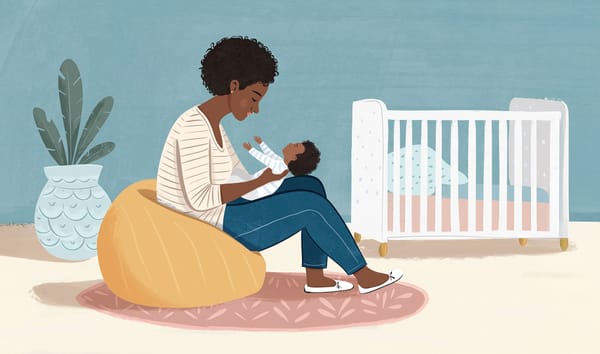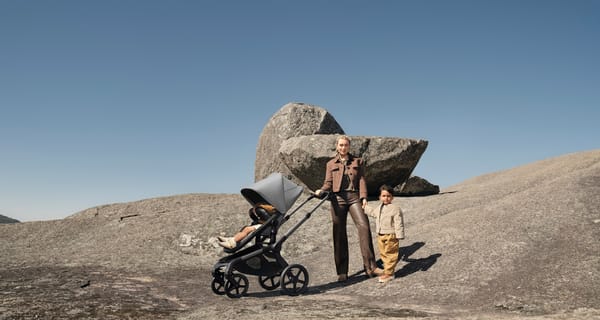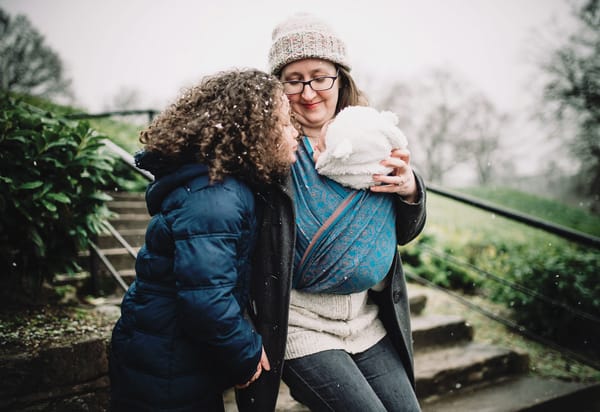And that’s OK. Read about how Emma Foley's radical acceptance of wakefulness transformed her experience of motherhood
Like many parents, early motherhood for me was synonymous with sleep deprivation. I was delirious at times, anxious as the night stretched ahead with no guarantee of sleep. The question of when my son might ‘sleep through’ was at the forefront of my mind – and the subject of regular late-night internet searches.
By the time this long-awaited night arrived, he was two and I was already heavily pregnant, with the associated insomnia dashing any hopes of me being able to sleep all night. My youngest is now almost three, and has yet to achieve this ‘milestone’ of a solid night’s sleep.
It sounds bleak – I haven’t had an undisturbed night’s sleep since becoming a mother five years ago. Knowing this in advance, in the early days, might have pushed me over the edge.
But the thing is – I’m fine. More than fine, actually. I’m relatively well-rested most days, I function well at work and I’m more than happy with our parenting choices. For all the tips, methods, and opinions out there about sleep, only one thing worked for our family – radical acceptance.
First of all, we started co-sleeping. It felt natural to have my baby (and later, babies) next to me all night, but in the early days I was terrified by what I’d read about the risks. This propaganda – I don’t think that’s too strong a word here – was backed by my health visitor, who advised sleep training instead. Her advice didn’t account for my instincts - the thought of leaving my son to cry for any length of time physically pained me.
Why I love bedsharing
So, we began to bedshare. I obsessively researched how to do this safely and woke the next morning feeling more rested than I had for months. Of course, my son had still woken, but I had fed him back to sleep each time, without even needing to sit up. It made a huge difference, and he was so toddler content being next to me all night. I loved it, I still love it and I cherish these nights.
In the early days, I’d check the time at each wakeup. I’d calculate how long it was until my alarm went off, or tally up how many times I’d been up so far. These statistics would then be relayed in the morning to my husband, my mum, even other mums at baby groups for comparison. Once we started co-sleeping, I stopped counting. My son’s needs were being met, and his sleep was biologically normal – tracking it served no purpose.
My husband and I parent equally in the day, and in the night we do the same. Our eldest is no longer breastfed, so my husband will go and settle him if he wakes up, usually getting in his bed and sleeping there with him. He now has a double bed, so there’s plenty of space – we did more than our fair share of squeezing into a cotbed with him! The youngest comes straight in with me when he wakes up and stays there, feeding as much or as little as he needs. It works for us.
Parenting doesn't stop when the sun goes down
We lay with them while they go to sleep, and we respond if they wake in the night – it’s simple. The need for comfort and connection doesn’t stop when the sun goes down. Some might see it as martyrdom, some might bristle at the thought of us changing our sleeping arrangements to suit our children. But it’s no sacrifice – it’s joyful, actually.
Adjusting our expectations and embracing responsiveness has changed everything, in a way that has nothing to do with how much or little they wake up. Their sleep was never the problem, and working around it rather than trying to ‘fix’ them has been the best parenting choice we’ve made. Emma is based in South Yorkshire, where she lives with her husband and two young sons. Through her writing and mindfulness sessions for mothers, Emma empowers parents to lean into their instincts and drown out the noise of modern parenting.
MORE INSPIRATION
FOLLOW For Emma’s writing work @emma_foley_writer/
READ The Baby Sleep Book

Nine Benefits of Co-Sleeping
Martha Sears of askdrsears.com writes about the ways that bedsharing can benefit your family
- Babies sleep better. The presence of a parent can ease baby through the transitions from light sleep to deep sleep which happen in the sleep cycles several times throughout the night.
- Mothers sleep better. Many co-sleeping mothers and babies share what we call “nighttime harmony” – their sleep cycles are in sync. Mothers are seldom awakened from a deep sleep to attend to baby.
- Babies grow better. Instead of wasting energy crying at night, baby can use that energy to grow. Extra touch co-sleeping babies get stimulates brain growth. Babies who sleep with their mothers get more milk at night.
- Mothers “grow” better. The extra nursing helps mother thrive and grow as a mum. Mums and babies are “in touch” for more hours, so mums enjoy higher levels of prolactin. They learn to know their babies very well.
- Fathers “grow” better. Many fathers do not have a lot of time with their children during the day. Co-sleeping gives them extra hours of closeness at night.
- Night feedings are easier. Because breast milk is digested more rapidly than formula, breastfed babies need more frequent feedings. With sleep cycles in sync, mum can partially awaken just in time for a feeding and easily drift back to sleep. Co-sleeping often helps breastfeeding work better – milk seems to flow better.
- Co-sleeping is valuable for mums who work outside the home. Breastfeeding at night helps to perk up a mum’s milk supply, which can dwindle if she is pumping rather than nursing during the workday.
- Co-sleeping babies tend to be better behaved. We have noticed, and long-term studies have confirmed, that co-sleeping babies tend to be easier to discipline. There is a lot more to say about this, check out The Baby Sleep Book!
- Co-sleeping is safer. There is also a lot to say about this sometimes controversial point. Again, read the book above!
Consider this. Co-sleeping occurs at the peak stage of brain growth – the first two years. Co-sleeping babies are less stressed at night. Babies forced to sleep alone against their desire are likely to have high levels of stress hormones at night. There is actually a term for stressed-out babies: glucocorticoid neurotoxicity. This is not something you want for your baby’s brain. Our colleague, Dr. James McKenna, Director of Mother-Baby Sleep Lab at Notre Dame University, has published eye- opening research on the psychological benefits of co-sleeping. Above all: Mother Knows Best. If your mother’s intuition tells you this is right for your baby, lie back and enjoy the long-term benefits of this warm relationship.







